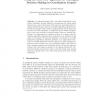1047 search results - page 134 / 210 » Learning the required number of agents for complex tasks |
AI
2007
Springer
13 years 8 months ago
2007
Springer
In this paper, we model multi-agent events in terms of a temporally varying sequence of sub-events, and propose a novel approach for learning, detecting and representing events in...
ICDAR
2007
IEEE
14 years 2 months ago
2007
IEEE
The Machine Learning and Pattern Recognition communities are facing two challenges: solving the normalization problem, and solving the deep learning problem. The normalization pro...
SEAL
1998
Springer
14 years 1 days ago
1998
Springer
Genetic programming evolves Lisp-like programs rather than fixed size linear strings. This representational power combined with generality makes genetic programming an interesting ...
AAAI
2008
13 years 10 months ago
2008
Heuristic search using algorithms such as A and IDA is the prevalent method for obtaining optimal sequential solutions for classical planning tasks. Theoretical analyses of these ...
ROBOCUP
2005
Springer
14 years 1 months ago
2005
Springer
Abstract. Coordination graphs offer a tractable framework for cooperative multiagent decision making by decomposing the global payoff function into a sum of local terms. Each age...

